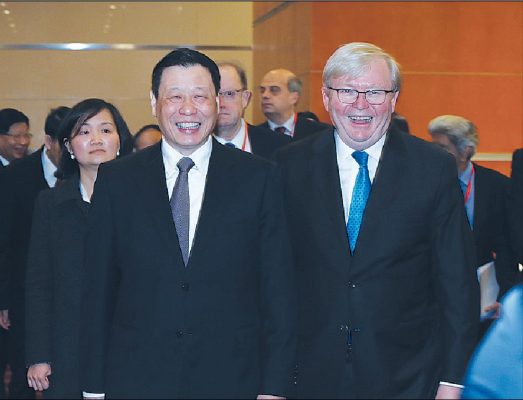
Building a community focused on the shared future for mankind is an important means to improving the state of the world, said the former prime minister of Australia Kevin Rudd on the sidelines of the seventh World Forum on China Studies in Shanghai.
Rudd, who is presently the president of the Asia Society Policy Institute in New York, was voicing his support for the concept highlighted by Chinese President Xi Jinping in a report to the 19th National Congress of the Communist Party of China in October.
First raised by Xi in 2013, the essence of the concept involves connecting the prospects and destinies of every country closely together, sharing good days and bad, and turning Earth into a harmonious family.
“Some people view it as idealism but I don’t agree. We need to carefully study common interests and values of the countries in the world and improve the existing international order,” said Rudd in Mandarin.
“This is a very important concept, and scholars both in China and abroad are studying it.”
Rudd also said during his keynote speech at the forum that the world is eager to find out more about China, including how the country’s financial system reforms are taking place, China’s future policies on foreign trade and investments, as well as how the Chinese leadership plans to deleverage its economy.
In this new era, there is a desire in each country to understand what the rise of China means for them and for each industry and profession, he said.
Rudd added that it is not just the responsibility of Chinese scholars, officials and politicians to help the world better understand China – those who specialize in the study of China should also do their part.
For the past 10 years, Rudd has been calling for the development of a “New Sinology”, which refers to a new emphasis on analyzing and explaining to the world what core Chinese concepts mean and to properly synthesize information.
“I’m asked by international and political leaders around the world about what the rise of China means for them. They are not just interested in a list of facts and figures – they want to understand the broader picture. And for that reason, Sinologists around the world have a responsibility to help paint that picture,” he said.
“We need to acquire a new school, which I might broadly describe as ‘China Synthesis’ – not just ‘China Analyses’,” he added.
Other characteristics of this “New Sinology” include breaking down the artificial barriers which have been created in the past that separate the “pro-China” from the “anti-China”.


